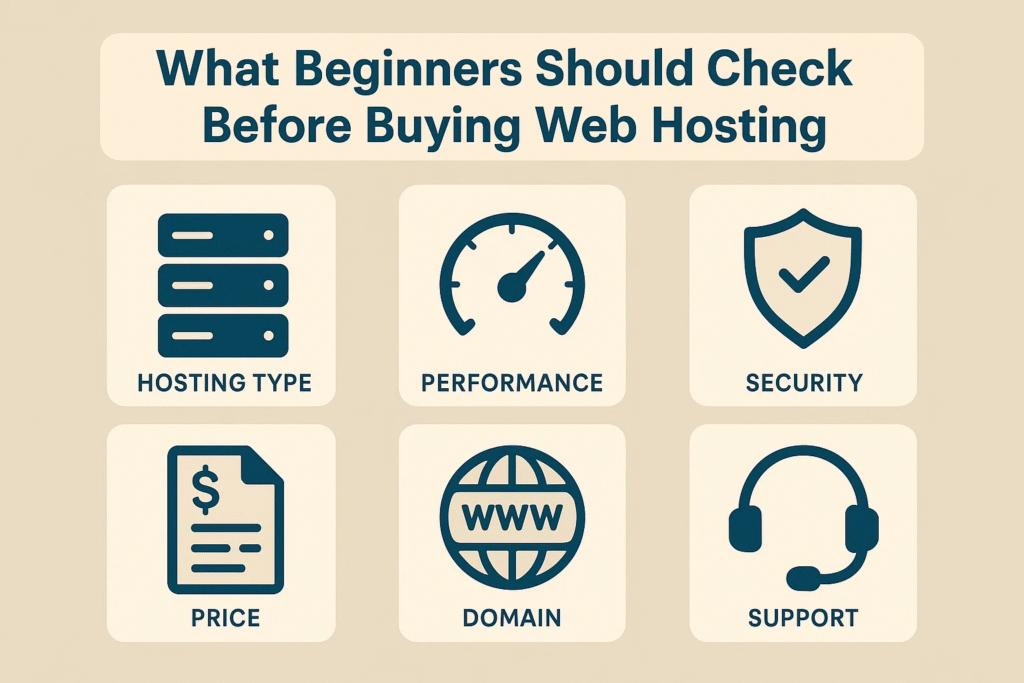When starting a new website, one of the most important decisions you’ll make is choosing the right web hosting. Hosting directly affects your website’s speed, security, uptime, and overall performance. Whether you’re starting a personal blog, an eCommerce store, or a professional portfolio, the hosting service you pick will determine how well your site runs.
But for beginners, the world of web hosting can feel confusing. There are so many types, features, and plans — it’s easy to make the wrong choice. Don’t worry — this complete guide will help you understand what to check before buying web hosting so you can make an informed and smart decision.
🌐 What is Web Hosting?
Web hosting is the service that allows your website files — such as images, text, and code — to be stored on a server and made accessible to users online. Think of it as renting space on the internet. Without hosting, your website wouldn’t be visible to anyone.
When a visitor types your domain name in their browser, the hosting server sends the data to their device, making your website appear on their screen.
In simple words:
Domain = Address of your house
Hosting = The land where your house is built
🧩 Why Choosing the Right Web Hosting Matters
Choosing a reliable web hosting provider is not just about price. It affects:
-
Website Speed – Faster websites rank higher on search engines and keep visitors happy.
-
Security – A good host provides protection against malware, spam, and hacking attempts.
-
Uptime – This means your website remains available 24/7 without downtime.
-
Customer Support – Beginners need quick and helpful assistance to solve issues.
-
Scalability – As your website grows, your hosting plan should grow with it.
In short, good hosting ensures your site runs smoothly, loads quickly, and stays secure — all of which directly influence your success online.
📊 Table: Types of Web Hosting and Their Best Use
| Type of Hosting | Description | Best For | Pros | Cons |
|---|---|---|---|---|
| Shared Hosting | Multiple websites share the same server. | Beginners, blogs, small business sites | Affordable, easy setup | Limited resources, slower performance |
| VPS Hosting | Virtual Private Server – you get a private portion of a server. | Medium sites, developers | More control, faster than shared | Slightly expensive |
| Dedicated Hosting | You get a full physical server for your site. | Large businesses, high-traffic sites | Full control, high performance | Expensive, needs technical knowledge |
| Cloud Hosting | Uses multiple servers connected in the cloud. | Growing websites, startups | Scalable, reliable | Can get costly as you scale |
| Managed WordPress Hosting | Optimized for WordPress sites. | Bloggers, WordPress users | Automatic updates, faster WP performance | Higher pricing |
| Reseller Hosting | You can host other people’s sites under your account. | Freelancers, web developers | Profit potential, easy management | Requires business management skills |
🔍 Key Factors Beginners Should Check Before Buying Web Hosting
Now let’s explore each important factor you need to consider before buying a hosting plan.
1. ⚙️ Hosting Type and Requirements
Before you buy hosting, think about what kind of website you are building.
-
If you’re just starting a personal blog, shared hosting is fine.
-
For an online store or portfolio, VPS or cloud hosting may be better.
-
If you expect thousands of visitors, go for dedicated hosting.
Tip: Don’t buy the most expensive plan right away. Start small, then upgrade when your traffic grows.
2. ⚡ Website Speed and Performance
Speed is one of the most important ranking factors. Users leave slow websites quickly, which hurts SEO and conversions.
When choosing a web host, check for:
-
SSD storage (faster than HDD)
-
CDN support (Content Delivery Network for global performance)
-
Caching technology
-
LiteSpeed or NGINX servers
A good hosting company should offer fast server response times and optimized infrastructure.
3. 🧱 Uptime Guarantee
Uptime is the percentage of time your website stays online and accessible. The industry standard is 99.9% uptime.
Even a 0.1% downtime can lead to hours of unavailability each month. Always choose hosting providers that clearly mention their uptime guarantee in the plan details.
4. 🔒 Security Features
Beginners often ignore security, but it’s critical. Your hosting provider should protect you from:
-
Hacking attempts
-
Malware and viruses
-
DDoS attacks
-
Data theft
Look for these features:
-
Free SSL certificate (HTTPS)
-
Daily or weekly backups
-
Firewall protection
-
Spam filters and malware scans
-
Two-factor authentication
Even if your site is small, security is non-negotiable.
5. 📞 Customer Support
No matter how “easy” hosting looks, you’ll need support at some point — especially as a beginner.
Check for:
-
24/7 customer support
-
Multiple contact options (live chat, email, phone)
-
Knowledge base or help articles
-
Quick response times
Good customer support saves you time, stress, and potential data loss.
6. 💰 Pricing and Renewal Costs
Most hosting companies advertise introductory offers that look cheap — but prices often rise on renewal.
Always check:
-
Initial price vs. renewal cost
-
What’s included (domain, SSL, backups, etc.)
-
Money-back guarantee
Don’t just go for the cheapest plan. The right hosting is about value, not just price.
7. 🧾 Storage and Bandwidth
-
Storage decides how much data (images, videos, files) you can store on your site.
-
Bandwidth decides how much data can be transferred to visitors.
For small blogs, 5–10 GB storage is enough.
For eCommerce or media-heavy sites, go for 50 GB or more.
Always ensure unlimited or high bandwidth options to avoid site slowdowns during high traffic.
8. 🧩 Ease of Use and Control Panel
If you’re a beginner, you need a hosting dashboard that’s easy to manage.
The cPanel or Plesk control panels are beginner-friendly. They let you:
-
Install WordPress with one click
-
Manage domains, emails, and databases
-
Check resource usage easily
Many hosts now offer simplified dashboards that are great for first-time users.
9. 🌍 Server Location
The closer your server is to your target audience, the faster your website loads.
For example:
-
If your visitors are from India, choose a server in India or Singapore.
-
For US visitors, go for servers in North America.
Some hosting providers offer global data centers — you can select one during signup.
10. 🔄 Backup Options
Regular backups protect your site from accidental loss or hacking.
Check if your host offers:
-
Daily/weekly automated backups
-
One-click restore feature
-
External backup storage
Even if the hosting provides backups, it’s a good idea to maintain manual backups periodically.
11. 🚀 One-Click WordPress Installation
If you’re building a WordPress website, ensure the hosting supports 1-click WordPress installation.
This feature saves you from manual setup, database configuration, or FTP uploads. It’s perfect for beginners who don’t have technical knowledge.
12. 📩 Email Hosting
Some hosting plans offer free business emails (e.g., info@yourdomain.com).
Check if your plan includes email hosting or if you need to pay extra. Having a professional email builds trust with your audience.
13. 📈 Scalability
What if your site grows faster than expected?
A scalable hosting service lets you upgrade resources easily — like CPU, RAM, or storage — without downtime.
Cloud and VPS hosting are great for scalability.
14. ⚖️ Resource Limitations
Some “unlimited” hosting plans actually have hidden limits on:
-
CPU usage
-
Number of inodes (files/folders)
-
Bandwidth throttling
Always read the Terms of Service carefully. Look for clear limits and resource policies.
15. 🔁 Refund Policy or Trial Period
A good hosting company always offers a money-back guarantee or a trial period.
For example, 30–45 days is standard. It lets you test performance, uptime, and support quality.
Avoid services that don’t offer any refund options.
📘 Table: Quick Comparison Checklist for Beginners
| Feature | What to Check | Why It Matters |
|---|---|---|
| Hosting Type | Shared, VPS, Cloud, Dedicated | Affects performance & cost |
| Uptime | 99.9% or higher | Keeps your site online |
| Speed | SSD, CDN, caching | Improves SEO & user experience |
| Security | SSL, backups, firewall | Protects data & site integrity |
| Support | 24/7 live chat, phone | Helps beginners fix issues |
| Storage | 10GB–100GB depending on use | Prevents running out of space |
| Bandwidth | Unmetered or high limit | Avoids slow loading |
| Control Panel | cPanel or Plesk | Easy to manage site |
| Server Location | Close to audience | Faster page load |
| Backup | Auto + manual options | Recovery from issues |
| WordPress Tools | 1-click install, updates | Ease of setup |
| Scalability | Easy upgrade | Future growth ready |
🧠 Pro Tips for Beginners Before Buying Hosting
-
Start small, upgrade later. Don’t overspend on features you won’t use initially.
-
Check reviews for uptime and customer service quality.
-
Always enable automatic backups before launching your site.
-
Avoid free hosting services — they come with poor performance and zero security.
-
Use SSL from day one to build user trust and improve SEO.
-
Monitor performance monthly to ensure consistent uptime and speed.
-
Don’t ignore renewal rates — they can be 2–3x higher than initial offers.
💡 Common Mistakes Beginners Make
| Mistake | Why It’s a Problem | Solution |
|---|---|---|
| Choosing based only on price | Cheap hosts often have poor uptime | Focus on value and features |
| Ignoring server location | Affects page load time | Choose region-based servers |
| Not checking renewal cost | Hidden charges later | Read plan details carefully |
| No backup plan | Risk of losing data | Ensure auto or manual backups |
| Skipping SSL setup | Hurts SEO & security | Enable free SSL immediately |
| Ignoring scalability | Limits growth | Pick flexible hosting plans |
🏁 Conclusion
Buying web hosting may seem technical, but with the right knowledge, it becomes easy.
To recap, always check for:
-
Reliable uptime
-
Fast performance
-
Strong security
-
Helpful customer support
-
Transparent pricing
-
Scalable resources
For beginners, shared hosting or managed WordPress hosting is a great place to start. As your website grows, you can move to VPS or cloud hosting.
Remember, hosting is not just an expense — it’s an investment in your website’s future. Choosing the right hosting now will save you money, effort, and frustration later.
Your hosting defines your site’s speed, safety, and stability — so take your time, compare wisely, and pick what truly fits your goals.
More


